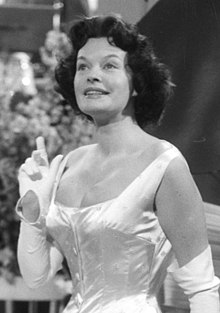Margot Hielscher
- View a machine-translated version of the German article.
- Machine translation, like DeepL or Google Translate, is a useful starting point for translations, but translators must revise errors as necessary and confirm that the translation is accurate, rather than simply copy-pasting machine-translated text into the English Wikipedia.
- Consider adding a topic to this template: there are already 9,156 articles in the main category, and specifying
|topic=will aid in categorization. - Do not translate text that appears unreliable or low-quality. If possible, verify the text with references provided in the foreign-language article.
- You must provide copyright attribution in the edit summary accompanying your translation by providing an interlanguage link to the source of your translation. A model attribution edit summary is
Content in this edit is translated from the existing German Wikipedia article at [[:de:Margot Hielscher]]; see its history for attribution. - You may also add the template
{{Translated|de|Margot Hielscher}}to the talk page. - For more guidance, see Wikipedia:Translation.
Margot Hielscher | |
|---|---|
 Hielscher at the Eurovision Song Contest 1958 | |
| Background information | |
| Born | (1919-09-29)29 September 1919 Berlin, Germany |
| Died | 20 August 2017(2017-08-20) (aged 97) Munich, Germany |
| Occupation(s) | Singer, actress |
Margot Hielscher (29 September 1919 – 20 August 2017)[1] was a German singer and film actress. She appeared in over fifty films between and 1939 and 1994.
Hielscher was born in Berlin. In 1957, she was chosen to represent Germany at the Eurovision Song Contest 1957 with the song "Telefon, Telefon" (Telephone, Telephone). The song finished fourth out of ten, with eight points.
Hielscher was chosen again to represent Germany at the Eurovision Song Contest 1958 with the song "Für Zwei Groschen Musik" (Music For Two Pennies). The song finished seventh out of ten, with 5 points.
In 1989, she starred in the TV series Rivalen der Rennbahn. She died in Munich, aged 97.
Awards
In 1978, Hielscher was awarded the "Bundesverdienstkreuz" and in 1985 the "Filmband in Gold" for her contributions to German cinema.
Selected filmography
- The Heart of the Queen (1940)
- Goodbye, Franziska (1941)
- Love Premiere (1943)
- Women Are No Angels (1943)
- Ghost in the Castle (1947)
- Hallo, Fräulein! (1949)
- The Blue Straw Hat (1949)
- Love on Ice (1950)
- Nights on the Road (1952)
- The Devil Makes Three (1952)
- Homesick for You (1952)
- Hit Parade (1953)
- Jonny Saves Nebrador (1953)
- Salto Mortale (1953)
- It Was Always So Nice With You (1954)
- The Mosquito (1954)
- Murder Party (1961)
- The Blood of the Walsungs (1965)
- Salto Mortale (1969, TV series)
- Die Kette [de] (1977, TV film)
- The Magic Mountain (1982)
- Doctor Faustus (1982)
See also
References
- ^ "Leinwand-Legende Margot Hielscher gestorben". Der Spiegel. 22 August 2017.
External links
 Media related to Margot Hielscher at Wikimedia Commons
Media related to Margot Hielscher at Wikimedia Commons
- Margot Hielscher at IMDb
- Photographs and literature
| Preceded by | Germany in the Eurovision Song Contest 1957 | Succeeded by herself with Für zwei Groschen Musik |
| Preceded by herself with Telefon, Telefon | Germany in the Eurovision Song Contest 1958 | Succeeded by |
 | This article about the Eurovision Song Contest is a stub. You can help Wikipedia by expanding it. |
- v
- t
- e
 | This article about a German singer is a stub. You can help Wikipedia by expanding it. |
- v
- t
- e











